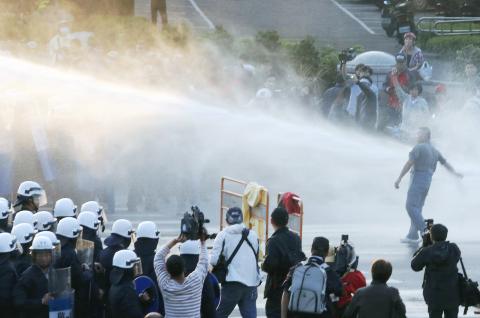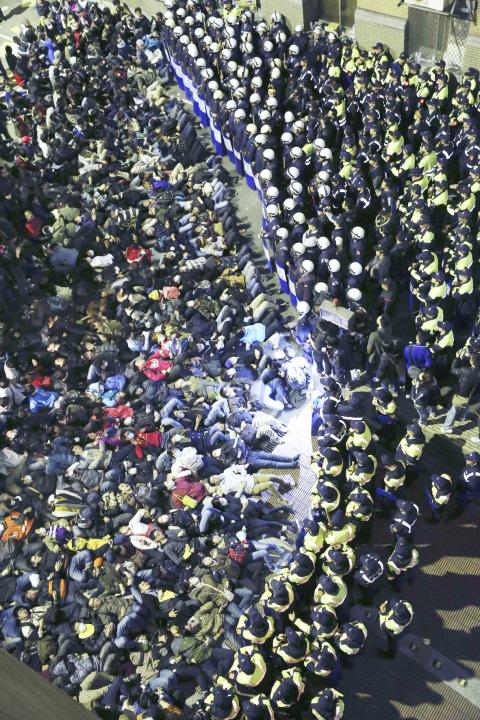At 5:45am yesterday, thousands of students protesting the cross-strait service trade agreement sat near the Executive Yuan complex on Zhongxiao E Road in Taipei “paying silent tribute to [the demise of our] democracy” and praying for the approximately 60 protesters injured when police forcibly ended their occupation of the Executive Yuan’s main building hours earlier.
The students said they “have no fear” of the possible repercussions their actions may have as they left the area to rejoin the protesters occupying the Legislative Yuan on the seventh day of the protest against the trade pact.
At 11pm on Sunday night, Premier Jiang Yi-huah (江宜樺) ordered the National Police Agency to evict the activists occupying the Executive Yuan before dawn. Jiang gave the order after speaking to President Ma Ying-jeou (馬英九) by telephone.

Photo: Reuters
After trying to pull, lift or drag protesters from the site, police employed two water cannon trucks, shields, batons and sticks to eventually remove all protesters from the Executive Yuan complex at 5:10am.
About 1,000 protesters remained outside on Zhongxiao E Road, while others gathered at the main entrance of the complex at the intersection of Zhongxiao E Road and Zhongshan S Road after 6am, prompting officers to turn the water cannons on them again. Not until after 7:15am were police able to reopen the roads to traffic.
The Executive Yuan said that at least 110 people were injured in the melee, including 52 police officers, while 61 people were arrested.

Photo: Reuters
At about 5:15am, several SWAT team officers approached Dennis Wei (魏揚) — a National Tsing Hua University graduate student and convener of the Black Island National Youth Front that masterminded the legislative siege — and handcuffed him because police believe he had instigated the storming of the Executive Yuan compound.
Wei had earlier said that confrontations with police at the Executive Yuan were to be expected, but “we [the protesters] are not deterred by that.”
“If we fear being forced out, we won’t be able to defend our democracy. We want to show the Ma administration the people’s determination,” he said.
The movement was sparked by the Ma administration’s perceived attempt to ram the pact through the legislature and follows months of calls by several sectors of society and public officials to renegotiate the deal or scrap it altogether.
Critics say the trade deal was negotiated illicitly without consulting the public, is skewed in China’s favor and puts Taiwan’s national security at risk, reasons cited by the protesters in their demands that the government suspend the pact and implement legislation to monitor future cross-strait dealmaking.
Less than an hour after hundreds of students forced their way into the Executive Yuan complex by throwing quilts over the razor wire around it, more than 2,000 activists gathered at the site, outnumbering the approximately 200-strong police force.
While more police were called in, the students set up audio equipment, moved in supplies from the legislature, hung up a giant banner, burst into some offices on the second floor of the main building and gathered at three main entrances and two other areas in the complex.
An hours-long standoff with police in all five places ensued, during which the students sat down arm-in-arm and shouted slogans as officers cleared people from Beiping E Road and assembled more riot police and SWAT officers there with two water-cannon trucks. The police force eventually numbered more than 3,000.
The protesters shouted at police to protect the people as the police drove a water cannon truck into the back door of the complex on Beiping E Road and forced some reporters from the scene.
At about 1:30am, the protesters lay down arm-in-arm to make their removal more difficult. Some with bleeding faces appeared to have been beaten up by police.
“I am really sad. My father is a police officer. Why are people in this country forced to attack each other? The police will kick you and beat you with batons,” said one man in tears who declined to be named.
A professor surnamed Fang (方) said police had kicked him in the chin, but that he “will go back, because my students are still there.”
Democratic Progressive Party (DPP) officials led by DPP Chairman Su Tseng-chang (蘇貞昌) urged police not to use force.
More people forced out of the complex were injured, including Taiwan Solidarity Union Legislator Chou Ni-an (周倪安) and a man suspected of suffering from epileptic seizures. They both lay on Beiping E Road for more than 10 minutes before being helped by medical personnel.
At about 4:20am, the police began to spray water at protesters gathering in the front square of the complex and at the entrance of the main building, and dragged some of them away. Scores of protesters lay down in front of the water cannon truck, and they were sprayed several times.
A man surnamed Chu (朱) said the police slapped him in the face when they pulled him out of the building.
“I didn’t resist the eviction. You wanted to lift me up from the ground, that’s fine, but why did you slap me?” Chu asked.
That night, ambulance sirens were heard often around the complex while medical volunteers rushed about to take care of emergencies.
“President Ma should take the biggest responsibility for the situation today, because he never listens to what people have to say. I didn’t think the Ma government should resolve any issue with the public by resorting to the use of police force. It will only create more resentment,” a man surnamed Kao said.
Meanwhile, saying that no violence should be used against students expressing their views on key national issues, the heads of the Greater Kaohsiung and Greater Tainan special municipalities — both governed by the DPP — yesterday said they are unwilling to offer further police backup to Taipei.
One-hundred-and-twenty officers who were sent from the two special municipalities to Taipei were recalled the previous week.
Additional reporting by CNA

CHAOS: Iranians took to the streets playing celebratory music after reports of Khamenei’s death on Saturday, while mourners also gathered in Tehran yesterday Iranian Supreme Leader Ayatollah Ali Khamenei was killed in a major attack on Iran launched by Israel and the US, throwing the future of the Islamic republic into doubt and raising the risk of regional instability. Iranian state television and the state-run IRNA news agency announced the 86-year-old’s death early yesterday. US President Donald Trump said it gave Iranians their “greatest chance” to “take back” their country. The announcements came after a joint US and Israeli aerial bombardment that targeted Iranian military and governmental sites. Trump said the “heavy and pinpoint bombing” would continue through the week or as long

TRUST: The KMT said it respected the US’ timing and considerations, and hoped it would continue to honor its commitments to helping Taiwan bolster its defenses and deterrence US President Donald Trump is delaying a multibillion-dollar arms sale to Taiwan to ensure his visit to Beijing is successful, a New York Times report said. The weapons sales package has stalled in the US Department of State, the report said, citing US officials it did not identify. The White House has told agencies not to push forward ahead of Trump’s meeting with Chinese President Xi Jinping (習近平), it said. The two last month held a phone call to discuss trade and geopolitical flashpoints ahead of the summit. Xi raised the Taiwan issue and urged the US to handle arms sales to

State-run CPC Corp, Taiwan (CPC, 台灣中油) yesterday said that it had confirmed on Saturday night with its liquefied natural gas (LNG) and crude oil suppliers that shipments are proceeding as scheduled and that domestic supplies remain unaffected. The CPC yesterday announced the gasoline and diesel prices will rise by NT$0.2 and NT$0.4 per liter, respectively, starting Monday, citing Middle East tensions and blizzards in the eastern United States. CPC also iterated it has been reducing the proportion of crude oil imports from the Middle East and diversifying its supply sources in the past few years in response to geopolitical risks, expanding

An Emirates flight from Dubai arrived at Taiwan Taoyuan International Airport yesterday afternoon, the first service of the airline since the US and Israel launched strikes against Iran on Saturday. Flight EK366 took off from the United Arab Emirates (UAE) at 3:51am yesterday and landed at 4:02pm before taxiing to the airport’s D6 gate at Terminal 2 at 4:08pm, data from the airport and FlightAware, a global flight tracking site, showed. Of the 501 passengers on the flight, 275 were Taiwanese, including 96 group tour travelers, the data showed. Tourism Administration Deputy Director-General Huang He-ting (黃荷婷) greeted Taiwanese passengers at the airport and